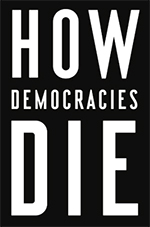26 February 2018
How Democracies Die, by Steven Levitsky and Daniel Ziblatt
Posted by Callan Bentley
 The authors of this essential study are both scholars at Harvard University. They specialize in studying the decay of democratic governments and societies, one in century-ago Europe, and the other in half-century-ago years ago Latin America. They spell out the structure of authoritarian takeover across these different contexts, and then turn to our situation in 21st century America. This book could not be more timely, more relevant, or more essential. I implore you to consume it.
The authors of this essential study are both scholars at Harvard University. They specialize in studying the decay of democratic governments and societies, one in century-ago Europe, and the other in half-century-ago years ago Latin America. They spell out the structure of authoritarian takeover across these different contexts, and then turn to our situation in 21st century America. This book could not be more timely, more relevant, or more essential. I implore you to consume it.
Republicans: read it.
Democrats: read it.
Americans: read. it.
Four key indicators of potential authoritarian behavior in national leaders are spelled out, and examples are given of each from various regimes in various countries over the past 100 years. They are: (1) rejection of (or weak commitment to) democratic rules of the game, (2) denial of the legitimacy of political opponents, (3) toleration of or encouragement of violence, and (4) readiness to curtail civil liberties of opponents including the media. If a leader, including a democratically elected one, shows any one of them, they can potentially transition to autocracy.
How many of these has Trump engaged in? Shockingly: all four. Quantitatively and qualitatively, Ziblatt and Levitsky document his authoritarian tendencies. Only the strength of the nation’s democratic institutions, both formal and unwritten norms, can keep the government on track. The authors show numerous cases during the administrations of Roosevelt, Lincoln, Jackson, and Nixon when checks and balances and adherence to norms helped tamp down Presidential authoritarianism (of both parties). Unfortunately, American democracy has been weakened seriously over the past thirty years. Trump entered the Presidency when American governance is more susceptible to authoritarianism than any time since the McCarthy era. The pump has been primed.
Significant discussion is given over to delving into two particular unwritten norms that serve to stabilize American governance: those of mutual tolerance and institutional forbearance. Mutual tolerance means seeing opponents as people, as citizens with rights the same as your own. When you start viewing your political opponents as traitors, when opponents have become enemies instead, mutual tolerance has broken down.
Institutional forbearance means not using all the tools that you can technically, legally use. For instance, the filibuster has traditionally been a weapon of last resort in Congressional deliberations, used rarely. The authors document the increase in its frequency through time. Similarly, threatening/forcing government shutdowns and other forms of brinksmanship have become standard tools, despite their brutal collateral effects on the country and its economy. These tools were once kept in reserve, but they are now deployed regularly. The standard has changed. The situation that transpired in the last year of Obama’s presidency, with the opening of a seat on the Supreme Court and Congress’s subsequent refusal to consider any Obama nominee, was an unprecedented example of the national change in standards of institutional forbearance. North Carolina’s (Republican) legislature’s emergency session to change the powers of the governor prior to the swearing in of a new (Democratic) governor is another example of how actions once considered outrageous are now seen as feasible.
How did we get to this point? Levitsky and Ziblatt document how Newt Gingrich initiated a new GOP culture of demonization of Democratic opponents, using adjectives like “sick” and “treasonous” to describe their behavior. Starting in the latest 1970s, but reaching its culmination during the mid-1990s, Gingrich’s reorganization of Congressional behavior inoculated a new culture into the Republican party, a take-no-prisoners attitude that was egged on and enabled by conservative media outlets, Fox News in particular. As Republicans stopped cooperating with Democrats, the Democrats had to respond. Did they continue to operate by the traditional rules of conduct (which had now been rendered ineffective) or did they respond to the new landscape by breaking some norms of their own? President Obama’s reliance on executive orders was a departure from the traditional way of doing things, but with such a hostile, recalcitrant Congress, it’s not clear he had too many other options if he wanted to have any kind of record of accomplishments. Norm breaking begets reactive norm breaking. The whole system has shifted into a new, less cooperative state of operation.
Thus Ziblatt and Levitsky demonstrate that the current toxic political landscape is a fallout from a GOP lurch to the right. We are polarized, but asymmetrically, and the trigger was pulled by Republicans. But Ziblatt and Levitsky aren’t focused on finger-pointing, merely explaining how the landscape we inhabit came to be. Over the past two decades, animosity has been accentuated, and we find ourselves in a time when a sitting U.S. president uses bullying and name-calling, threatens opponents with prison, praises white supremacists, and demonizes the media. This is just his “in-house, on the job” behavior; it doesn’t even touch the unsettling possibility of Trump’s coordination with a hostile foreign power (Russia) or his crass, unfaithful, dismayingly sexist, disrespectful personal behavior. This is the world we inhabit.
If we want to preserve the American system of governance, citizens and representatives of all parties need to demand adherence to mutual toleration and a commitment to seeing their opponents as legitimate fellow citizens. The first step is probably for you to read this book.


 Callan Bentley is Associate Professor of Geology at Piedmont Virginia Community College in Charlottesville, Virginia. He is a Fellow of the Geological Society of America. For his work on this blog, the National Association of Geoscience Teachers recognized him with the James Shea Award. He has also won the Outstanding Faculty Award from the State Council on Higher Education in Virginia, and the Biggs Award for Excellence in Geoscience Teaching from the Geoscience Education Division of the Geological Society of America. In previous years, Callan served as a contributing editor at EARTH magazine, President of the Geological Society of Washington and President the Geo2YC division of NAGT.
Callan Bentley is Associate Professor of Geology at Piedmont Virginia Community College in Charlottesville, Virginia. He is a Fellow of the Geological Society of America. For his work on this blog, the National Association of Geoscience Teachers recognized him with the James Shea Award. He has also won the Outstanding Faculty Award from the State Council on Higher Education in Virginia, and the Biggs Award for Excellence in Geoscience Teaching from the Geoscience Education Division of the Geological Society of America. In previous years, Callan served as a contributing editor at EARTH magazine, President of the Geological Society of Washington and President the Geo2YC division of NAGT.
If the political unadulterated sensing and mindset of the Past President of the Geological Society of Washington, is so well equipped as this particular interesting content of this book, that is helping us to keep our foots on the ground, then I wonder, what kind of political pressure should exist now for those that are responsible to conduct and harmonize the President’s policy of actions in the White House?
Your stand and your choices did make us better,
And I Thank you for this.
Yours,
Gavriil.
I think we all need to call out norm-breaking and disrespect when we see it. We all need to prioritize the commonwealth (country) over ideology/identity (party).